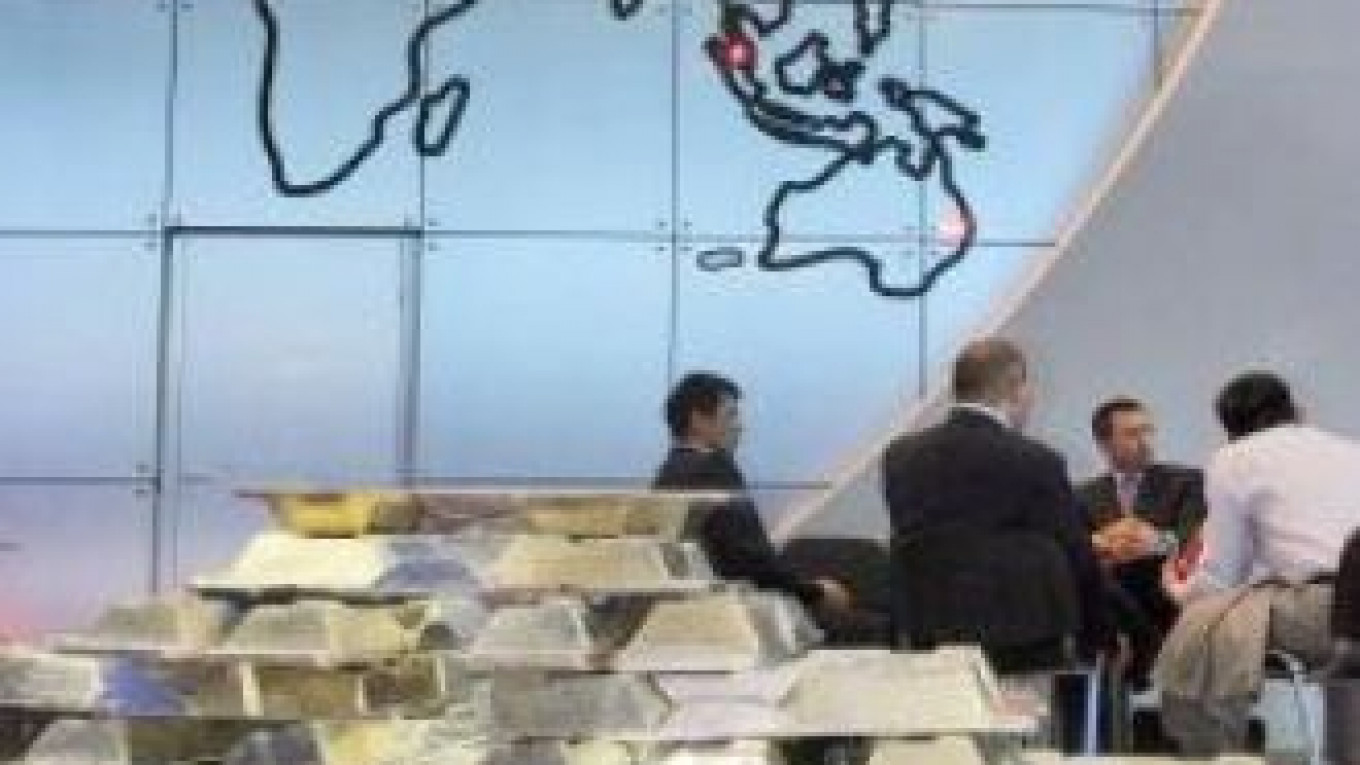The world's leading aluminum company, RusAl, reported a $438 million net loss and announced new large-scale capacity cuts on Monday as producers struggle with a glut of metal and plummeting prices.
RusAl's net loss totaled $438 million in the first half of 2013, compared with a $1 million net profit in the same period last year, while its revenue fell 8.8 percent year on year to $5.203 billion.
Aluminum prices on the London Metal Exchange (LME) continued to decline through the first half of the year, falling by 7.8 percent year-on-year to a period average of $1,919 per ton.
"Our industry remains in a crisis of its own making with oversupply leading to an excess of products on the market. This status quo cannot be allowed to continue and the sector as a whole needs to take action to optimize," Oleg Deripaska, CEO of RusAl, said in a statement.
At the same time, physical demand for aluminum continues to grow steadily.
RusAl estimates that in the first half of 2013 global primary aluminum consumption reached 25 million tons and is expected to reach 50 million tons by the end of the year, a 6 percent increase compared to 2012. China remains the fastest growing market with an expected 9.5 percent growth rate, followed by India, Asia excluding China and North America.
RusAl sounds a bit overoptimistic on aluminum demand in the U.S., some experts said.
"The aluminum demand in the U.S. was up only 2 percent year on year in the first half of 2013," said Boris Krasnozhenov, an analyst at Renaissance Capital. "At the same time, RusAl forecasts 5 percent aluminum consumption growth in North America this year. We doubt that U.S. consumption will see that much in the second half of 2013."
Although physical demand for aluminum remains, production is unlikely to increase substantially because of large stocks accumulated by traders, said Dmitri Baranov, a senior analyst at Finam Management.
The LME currently holds 5.4 million tons of aluminum.
After several court cases followed continuous holdups of metal by traders there were proposals to overhaul LME delivery system. This will force warehouses to release more stocks, and the prices are expected to go down even further.
"Premiums have started to fall already, and we'd expect if the LME implements the proposals, then we'll see a reduction in warehouse queues from next year … that would push premiums down further," consultant Marco Georgiou of mining research company CRU in London was quoted by Reuters as saying.
In an earlier interview with Interfax, Oleg Deripaska said that at current LME prices, roughly 40 percent of smelting plants around the world, excluding China, would remain unprofitable and would be forced to cut production. By the end of the year, the company is expecting that the world's aluminum production will decrease by a total of 1.8 million tons, he added.
RusAl itself is cutting down on production capacity in a move to counter the effect of falling prices and has halted or limited smelting at several of its facilities in western Russia and Siberia, the company said in a statement, not disclosing, however, which plants in particular were at stake.
Media reports said earlier that four plants in Western Russia that use obsolete equipment and are deemed inefficient could be shut down.
Overall, in the first half of the year the company reduced its aluminum output by about 100,000 tons compared to the same period in 2012 and plans to cut production capacity further to a total of 357,000 tons by the end of 2013, a 9 percent decrease since last year, compared to the previously announced 7 percent cut.
"The key challenge is massive overcapacity in the sector and inefficient production across major players," Krasnozhenov of Renaissance Capital said. "RusAl is moving in absolutely the right direction when it suspends loss-making production sites, in our view. We see the same trend in the steel and mining sectors."
One of RusAl's old and ineffective smelting plants is the Bogoslovsky alumina facility in the Sverdlov region, which was launched in 1945.
RusAl initially announced plans to shut it down, but they have not yet been confirmed by the management despite repeated requests voiced by the plant's labor union to give the workers an insight into what their future career may look like.
Instead, in mid-August, just before releasing its mid-year results, RusAl signed an agreement with IES-Holding to buy Bogoslovsky power plant, which is the main energy source for the alumina plant. This purchase was made in an attempt to reduce the price of energy for the facility, thus lowering production costs.
But last year the workers of the Bogoslovsky plant were taken on a trip to see the new Boguchansky aluminum smelter, a state-of-the art facility able to generate 600,000 tons of aluminum per year being built on equal terms together with hydropower producer RusHydro in the Krasnoyarsk region.
The plant will employ 3,500 workers and some young specialists from the Bogoslovsky plant are already considering an opportunity to move to Siberia, local media reported.
It is now 75 percent complete and there were plans to start production there by the end of 2013. However, these plans have been recently postponed.
RusAl first deputy CEO Vladislav Solovyov said at a conference call on Monday that it could start production in 2014.
"We are currently examining the project with our partners — RusHydro and VTB — which provided the financing," Solovyov said, Prime reported. "We are reevaluating its financial aspect and after that we will decide when to begin production. It is very likely that it will not start this year but will be postponed to 2014."
Finam analysts said that this just means that RusAl was changing its plans due to unfavorable market conditions, an opinion which was backed by the company's own announcement accompanying its half year report.
"As of today, more than 3 million tons of aluminum capacity [at the LME] could potentially be closed by the end of this year. At the same time the industry needs further restructuring and reduction in large aluminum stocks to guarantee sustainable development," RusAl said in a statement.
Oleg Deripaska said earlier that aluminum production at RusAl facilities could be fully restored if prices for the metal reached $2,400 per ton, but he did not expect this level in the next four years.
A Message from The Moscow Times:
Dear readers,
We are facing unprecedented challenges. Russia's Prosecutor General's Office has designated The Moscow Times as an "undesirable" organization, criminalizing our work and putting our staff at risk of prosecution. This follows our earlier unjust labeling as a "foreign agent."
These actions are direct attempts to silence independent journalism in Russia. The authorities claim our work "discredits the decisions of the Russian leadership." We see things differently: we strive to provide accurate, unbiased reporting on Russia.
We, the journalists of The Moscow Times, refuse to be silenced. But to continue our work, we need your help.
Your support, no matter how small, makes a world of difference. If you can, please support us monthly starting from just $2. It's quick to set up, and every contribution makes a significant impact.
By supporting The Moscow Times, you're defending open, independent journalism in the face of repression. Thank you for standing with us.
Remind me later.






